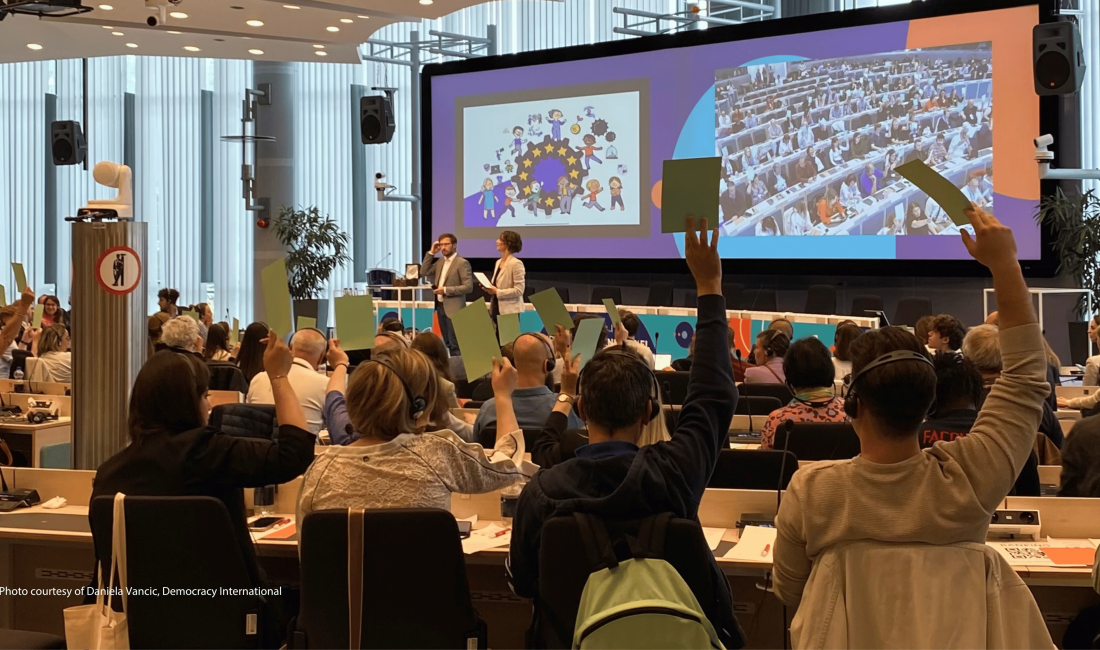How would you allocate €1.8 trillion and shape the future of Europe for the next seven years? Defence? Digitalisation? Democracy? That’s exactly what 150 randomly selected citizens were asked when they gathered for the latest European Citizens' Panel (ECP) in Brussels. Their task was to weigh in on how the EU should spend its budget to tackle the most pressing issues of our time, from climate change to healthcare, digitalisation to youth employment. I had the opportunity to follow the discussions and unique process live, on the ground.
Over three weekends, these citizens from all 27 Member States worked together to discuss what the EU should prioritise in its next budget. This process allowed them to directly influence key decisions on how the EU allocates its financial resources, ensuring that the budget is shaped by those it impacts the most: the people. The 150 participants for the panel are recruited so that they represent a wide cross-section of society, namely six criteria: geography (urban/rural), gender, age, education, socioeconomic background, and attitudes toward the EU (positive, negative, or neutral). The panels have a strong youth component, with one-third being reserved for young people aged 16-25 years old. In fact, the youngest participant was 16 years old, while the oldest was 81. This ensured that the panel was truly representative of the European population, capturing a broad spectrum of views and experiences.
This isn’t the first time the EU has dabbled with citizens’ assemblies. Over 1500 citizens now belong to the special club of ECP alumni. The first and largest full-scale experiment was the Conference on the Future of Europe, which concluded in 2022, where 800 citizens representing the EU’s diversity were selected. Since then, the ECPs have been held and coordinated by the European Commission on an ad-hoc basis and have become a regular component of European democracy and citizens’ engagement. In addition to the panel on budget, five other Panels have taken place since 2022: on food waste, virtual worlds, learning mobility, energy efficiency, and tackling hatred in society.
The results of this Panel on budget, ultimately a set of 22 actionable recommendations, reflect a shared ambition for a fairer, greener, and more inclusive Europe. Among the key areas they emphasised was greater opportunity. The citizens called for a budget that supports small and medium-sized enterprises and start-ups, which they believe are crucial for a competitive and eco-friendly European economy. They also highlighted the importance of equal access to healthcare, including mental health services, and cross-border healthcare initiatives to ensure all citizens can access the care they need. Another significant focus was on youth employment, with participants recommending that the EU prioritise fair, decent working conditions for young people, ensuring they can enter the labour market with adequate support and opportunities. Digitalisation also made a strong case in the recommendations. Citizens suggested strengthening Europe’s digital sovereignty by investing in cybersecurity, AI, and digital infrastructure, while ensuring that digital education is inclusive for all citizens.
But perhaps the most interesting recommendation for those in the democracy circles is that the panel emphasised the need for greater citizen engagement in decision-making processes. The citizens called for increased transparency and efforts to bridge the gap between EU institutions and citizens, ensuring that the EU truly reflects their values and concerns.
Beyond the recommendations themselves, I paid close attention to the methodology of the deliberative process. Those familiar with the early days of the ECPs during the Conference on the Future of Europe’s will find that the deliberative methodology hasn’t changed much. In fact, there have been some improvements. The Working Groups of approximately 12 people no longer work in silos on their assigned topic, but they also provide feedback to 2-3 other Working Group topics. This ensures a wider range of diverse voices and allows for more debate and discussion over the drafting of recommendations.
Additionally, the outreach efforts to citizens exclusively involved the door-to-door method this time, which produced more positive acceptance rates - reportedly 3-10%. They also now include “attitudes towards the EU” as soft criteria for recruitment so that citizens have EU attitudes that are reflective of the latest Eurobarometer survey.
An interesting aspect of the process was the involvement of a Knowledge Committee that provided expert advice throughout the deliberations - a key feature that could have the potential to steer conversations in a particular direction. Among academics and other experts, the Knowledge Committee included professionals from within the EU institutions, such as the European Commission and the Directorate-General for Budget, leading to questions over the independence of the advice given. While the need for a Knowledge Committee is unquestionable, especially in ensuring that discussions are informed and grounded in expertise, there are aspects that could be improved. In good practices of citizens’ assemblies, an independent advisory board typically selects the experts. This approach ensures objectivity and minimises potential conflicts of interest. The benefit of having internal members, such as those from the Commission, lies in their ability to offer valuable feedback on the feasibility of recommendations and provide insight into which ideas have the greatest potential for implementation. However, this should not be the primary goal of a citizens' assembly. The core of these assemblies is to empower citizens to propose bold, innovative, and transformative recommendations, not simply to reflect what is already seen as politically or administratively viable.
Lastly, while the ECP process is both innovative and highly valuable in its inclusivity, it raises a fundamental democratic question: will the citizens' recommendations truly influence the EU’s budgetary decisions? The 22 final recommendations are ultimately practical, grounded in current EU priorities, and well within the scope of what the Commission and the EU institutions can realistically address. If the EU is to build a future that is genuinely democratic and responsive to its people, it is essential that these citizen-driven recommendations are not merely consultative but serve as a cornerstone in shaping the EU’s financial planning.
The Commission will present its final report on the EU’s long-term budget on 16 July 2025. As we approach the next EU budget, which will begin in 2028, it is more crucial than ever that the EU remains committed to strengthening participatory democracy. While the ECP is a promising step forward, its true impact will only be realised if citizens' voices continue to play a central role in shaping not only the EU’s budget but its broader policies and priorities. We cannot discuss democracy without also addressing how we fund it. The EU has the opportunity to lead globally by putting its money where its mouth is—ensuring that our values and priorities are reflected in meaningful investments for the future of Europe.
Looking ahead, the next Panel this autumn will tackle the topic of Intergenerational Fairness, another vital issue that will impact the EU’s future policy strategy. It will be fascinating to see how citizens across generations weigh in on the challenges and opportunities of an ageing population, youth unemployment, and economic and social equity.




